Colorectal cancer rising in young Kentuckians. What to know about getting tested, symptoms
More Americans younger than 50 are experiencing a concerning rise in colorectal cancer rates, and the top researcher at the University of Kentucky’s Markey Cancer Center says Kentuckians in particular should be alert to the dangers.
The American Cancer Society made headlines in January when it warned increases in certain types of cancer among young Americans threaten to erode the gains made in reducing overall cancer deaths in recent decades.
That includes colorectal cancer. In the last 30 years, it’s moved from the fourth leading cause of cancer death in men and women younger than age 50 to the second leading cause in women younger than 50 and the No. 1 leading cause in men of that age.
“We’re finding it’s actually going up, and it’s going up at an alarming rate,” Dr. Thomas Tucker, the senior director of cancer surveillance at the UK Markey Cancer Center, said in an interview.
What’s more, Kentuckians in particular are at risk, Tucker points out.
Research has shown early onset colorectal cancer has the highest incidence in southern states and in Appalachia, with Kentucky reporting the highest incidence rate of 14.3 cases per 100,000 individuals aged 20 to 49 between 1995 and 2015, according to one study.
What’s driving the increase of colorectal cancer among young Americans, in Kentucky and across the country, isn’t clear and is difficult to pinpoint. Scientists point to rising obesity rates, sedentary lifestyles and diets that damage the body’s microbiome, among other factors, as possible culprits. Still, according to Tucker, it’s worth remembering: “This is a preventable disease.”
Here’s what you need to know about colorectal cancer to reduce your risk.
What is colorectal cancer?
Put simply, colorectal cancer is a disease in which cells in the colon or rectum grow out of control and potentially spread to other parts of the body.
The disease can begin with abnormal growths, called polyps, that occur in the colon or rectum, and over time those polyps become cancerous. Luckily, doctors have several effective screening tools, such as colonoscopies, which can remove the polyps once detected.

What should I know about screening for colorectal cancer?
The general recommendation is adults between the ages of 45 and 75 should be screened regularly.
However, if you have a family history of colorectal cancer, you should be screened earlier, perhaps as young as 40 or 10 years younger than the age your immediate family member was when they were diagnosed.
March is Colorectal Cancer Awareness Month.@AlokPatelMD: "Awareness and screening is key and can save lives." pic.twitter.com/MpSLsa6Xq2
— ABC News Live (@ABCNewsLive) March 1, 2024
Tucker recommends being proactive when it comes to establishing family history. Talk to your family members about colorectal cancer, and be aware as many as 1 in 3 people with this type of cancer have other family members who’ve had it. If you have an immediate relative with the cancer, such as a parent, sibling or child, you are at increased risk.
What are the first signs of colorectal cancer?
The Mayo Clinic lists the following as possible symptoms of colorectal cancer:
Changes in bowel habits, more frequent diarrhea or constipation
Rectal bleeding or blood in the stool
Ongoing discomfort in the belly area, including cramps, gas or pain
A feeling that the bowel doesn’t empty all the way during a bowel movement
Feeling persistently weak and tired
Unintentional weight loss
If you notice lasting symptoms, you should see a doctor and get screened.
Do you have a question about health in Kentucky for our service journalism desk? Connect with us at ask@herald-leader.com. You can also submit your question with the Know Your Kentucky form below.

